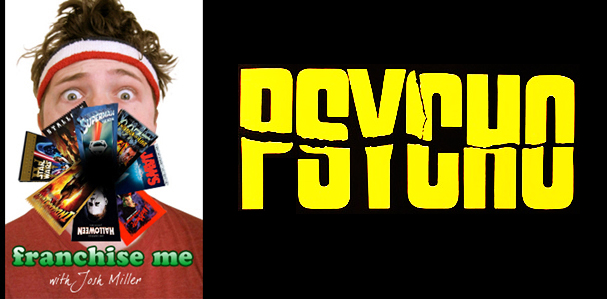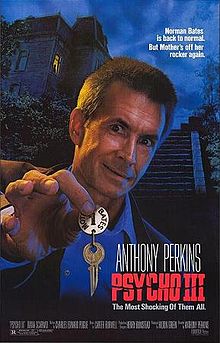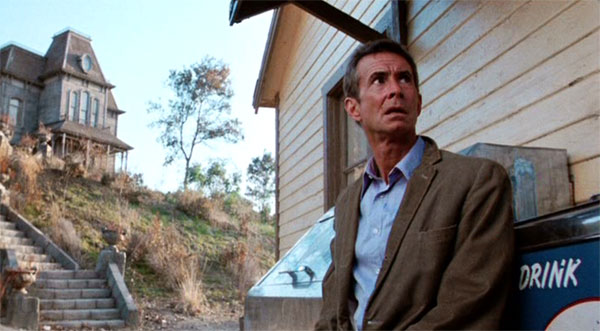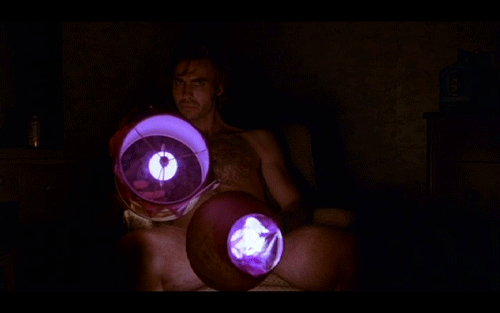
Hollywood loves a good franchise. The movie-going public does too. Horror, action, comedy, sci-fi, western, no genre is safe. And any film, no matter how seemingly stand-alone, conclusive, or inappropriate to sequel, could generate an expansive franchise. They are legion. We are surrounded. But a champion has risen from the rabble to defend us. Me. I have donned my sweats and taken up cinema’s gauntlet. Don’t try this at home. I am a professional.
Let’s be buddies on the Facebookz!
The Franchise: Psycho — following the deadly legacy of the Bates Motel and its primary caretaker, Norman Bates (Anthony Perkins). The series launched with Alfred Hitchcock’s 1960 landmark adaptation of author Robert Bloch’s novel of the same name, and spawned over the next 38 years three sequels, a failed TV series that was converted into a failed TV movie, and the most infamous remake in recent cinema history. We shall be checking in over night on all six Psycho installments.
previous installments
Psycho
Psycho II
The Installment: Psycho III (1986)

The Story:
We pick things up shortly after the end of Psycho 2, when Norman found out that the kindly Emma Spool was his real mother and promptly bashed her skull in with a shovel like a good son. Now, a month later, Emma Spool’s disappearance is the talk of the town, and no one suspects that Norman has mummified her and returned to his split-personality shenanigans. No one except pesky reporter Tracy Venable (Roberta Maxwell), who has come to Farvale to expose the truth about Norman. This coincides with the arrival of two other newcomers in Fairvale: Duane Duke (Jeff Fahey), a handsome and opportunistic musician who takes a job as the Bates Motel’s manager, and Maureen Coyle (Diana Scarwid), a disgraced nun who left the convent after an attempted suicide. When Norman meets Maureen she triggers memories of Marion Crane in his mind and the two set off on an awkward romance. Meanwhile, Norman starts killing naughty girls who come to the motel, and Tracy digs up some more retconning for the franchise. Yay! Retcon! Everyone loves that.

What Works:
Just looking at that poster for Psycho III you know the franchise has gone through the looking glass. There was an obvious cash-in motivation on Universal’s part with Psycho II, but there was nonetheless some relevancy in Norman Bates showing up to jam with his disciples in the subgenre he helped inspire — like Chuck Berry in Hail! Hail! Rock ‘n’ Roll. If Chuck Berry had decided to release an album of hair metal covers after that, it might be a bit like Psycho III. In a bid to stay relevant in 1986, the franchise has fully embraced the subgenre it spawned, or as a Chewer succinctly put it on our message boards — Psycho III is where the slasher trend reverse infected the original carrier. We’re in full ‘disposable entertainment’ mode now. Though, depending on how you look at it, that doesn’t preclude enjoyment on our part. I’d pay good money to hear a Chuck Berry album of Motley Crue, Poison and RATT covers. And I’d fully expect it to be ridiculous. As a quality piece of cinema Psycho III is decidedly stupid. But as a stupid piece of cinema it is decidedly appealing.
Your mileage will vary on III depending on how seriously you took II. I couldn’t take the Emma Spool retcon seriously at all (which isn’t to say I didn’t enjoy what it afforded the rest of the film). As much as I dug II, I consider it separate from the first film. It does not complete a Godfather I & II pair of chapters my mind. So as a horror fan I have a hard time holding Psycho III accountable for itself when there was no reason to make Psycho II in the first place. It was not a brilliant story begging to be told, but it was a lot of fun, and it revealed that there was still life to be found in the Bates Motel. Plus, as far as franchises that never should have happened go, Psycho‘s is in a better place than a franchise like, say, Jaws, where each new installment is inherently tenfold more preposterous than the last due to the unrepeatability of its core concept. Norman Bates has never died, and last we saw him he’d gone crazy again but was still living free. Yes, II would have been a nice place to stop the franchise, leaving us with the satisfyingly twisted knowledge that Norman was clearly going to kill again. Though, knowing that, its not that uncalled for to continue the saga and see what happens. It’s not like they need to jump through hoops to explain how Norman survived his house blowing up or anything.
Bottom line: Psycho III may be a huge step down from Psycho but it makes a pretty nice companion piece and resolution to Psycho II — we have Perkins in full force once more, the same sets, the same Farivale locals, a similar caliber of FX and production design, a similar caliber of cinematography (Clint Eastwood’s former go-to, Bruce Surtees), and a relatively similar caliber of music (an early work of off-beat master Carter Burwell). Even Anthony Perkins’ annexation of directing duties is surprisingly acceptable (me thinks he paid a lot of attention to Hitchcock and Franklin). The only facet that truly fails us is the script, which we’ll get to in the next section.
Due in part to the hackwork script, Psycho III‘s success rests more heavily on Norman than II did, which had an intriguing mystery to keep us involved, and the end result is that despite being the protagonist of a crappier movie now, I actually found Norman Bates to be a more credible character here than I did in II. As I noted last time, I thought it was a questionable move to ignore whether or not Norman had any guilt about what he’d done, especially because ignoring the issue sort of implied that he didn’t feel guilty. One of III‘s better written scenes is Tracy the reporter’s introduction, in which Sheriff Hunt (affably played again by Hugh Gillin) and diner owner Ralph (gruffly played again by Robert Alan Browne) defend Norman’s sanity. When Norman enters, Tracy pounces on him for a conversation, and we learn that Norman doesn’t feel as though he has truly paid his debt, because there is no way to bring back those he’s killed. He doesn’t blame the people who hate him. This of course works all the better knowing that Norman is off his nut again, and will soon be racking up more victims to feel guilty about. It is a very minor detail, but I like hearing the words come out of Norman’s mouth. And I like seeing Perkins nervous and edgy, now entirely lacking the somewhat uncharacteristic confidence (bordering on bravado) he displayed during the first half of Psycho II. In the bigger sense it may be disappointing to see Norman back to where he was in the first film, but that was after all the character Anthony Perkins was selected to play. Perkins arms also seem to be getting longer with each film, aging him into a bizarre gangle-creature.
Jeff Fahey steals this entire movie with his eerie too-blue eyes and seedy charm. Duke is an unusual character. He’s a friendly charmer who picks up our woebegone nun Maureen while she’s hitchhiking, and them makes an unwanted pass at her moments later. So now he’s a rapey perv. But when he meets her again he apologizes and swears he won’t make another pass, and he never does. Duke is wholly opportunistic, and blows where circumstances take him, making him a villain and an ally, depending on the situation. Duke is really the pulse of Psycho III, as his relationships with the various characters are the most dynamic character-to-character parts of the film. His relationship with Tracy is great, as she openly calls him on all his bullshit – “You know, you really shouldn’t rely so much on that pretty face and those pearly whites, cause comes-ons like that could get them both punched out. Then you’d be left with only your charm.” – while nonetheless employing him to spy on Norman. Duke’s personality is summed up in his first scene with Norman, where Duke is eyeballing the open cash register in the motel’s office. Duke advises Norman that he shouldn’t leave it open, yet clearly would have taken the cash himself had Norman not shown up. He gives Norman some genuine older-brother-esque encouragement to hoke up with Maureen when Norman seems too nervous to pick up on Maureen’s body-language. Yet Duke is conspiring behind Norman’s back with Tracy. Yet he saves Norman from the police when they come with a search warrant looking for Emma Spool’s corpse. Yet he blackmails Norman for some money.
Duke is also a symbol of Psycho III‘s off the rails approach. His bedroom is swathed in elaborate collages of magazine pornography, which, judging from the sheer amount he’s worked up in the couple days he’s been at the motel, Duke must carry around in a suitcase solely dedicated to his porno art. Cause there is a lot of it. It is production design with little footing in reality, but that is the atmosphere of Psycho III and it is funny as hell. Duke’s “steamy” sex scene with a local bar skank may actually be the highlight of the film. It is our first glimpse of his private porno museum, and while the skank tries to act sexy with a cigarette on Duke’s bed, he puts on his own little show for her, sitting naked and greasy in a chair, using two lamps covered with colored gels like airport ground-control wands. Why? Who knows. It needs to be seen to be believed. So I made a gif! (see bottom of page)
Norman never truly had to pay for his crimes, and fittingly there is a redemption motif in Psycho III. Though the religious themes involved are simultaneously on-the-nose and muddled, Maureen the nun’s subplot adds a wrinkle to what is otherwise a rote Psycho rinse-and-repeat. The film opens over black with Maureen disturbingly screaming “There is no god!” and for a moment things seem like they might be intensely dramatic, until Maureen accidentally causes another nun to sensationally plummet to her doom down the center of a bell tower and we realize, “Oh, wait, this movie is going to be absurd.” Maureen doesn’t totally work as a character, but I like what she does for the film. Apparently no sequel can resist putting its own tweak on the classic shower scene, and Psycho III surprises with a clever and complex vamp — Norman, in full “Mother” uniform, stalks into Room 1 to stab the shit out of Maureen in the shower, only to discover her lying in the bath with her wrists suicidally slit. Norman takes over from Mother and saves Maureen. In her near-death stupor, Maureen hallucinates that Norman is the Virgin Mary. It is an awesomely fucked up meet-cute from which their fumbling romance grows. Seeing Norman Bates on a date is excellent. And at least on a conceptual level, I think exploring Norman’s attempt to date – without Mother immediately killing the girl – is good story fodder.
There is nothing in Psycho III to rival the kind of mastercrafting seen in the first film, but Anthony Perkins and screenwriter Charles Edward Pogue do give us some fun bits. The scene where Sheriff Hunt is eating ice from the ice machine containing a corpse, after failing to find anything suspicious in the Bates house, is a wonderfully macabre piece of dark humor — Hunt, sweating on a hot day, cluelessly grabs a piece of bloody ice and jams it in his mouth, as Norman sits in anxious silence waiting for Hunt to realize what is happening. But he never does. There is another cute corpse bit, where Norman is trying to move a dead body when some partying motel guests suddenly come around the corner. From the position Norman is in it looks like he is making out with the corpse, and the partygoers move on none the wiser. I also loved our introduction to Norman, as we pass the tattered copy of In the Belly of the Beast that Mary was reading in Psycho II, up to a bird feeder, where the birds suddenly drop dead, clearly poisoned. And Perkins does a commendable job inserting little details throughout the film, such as, during the climax when Norman (as Mother) straightens a painting Tracy had bumped while fleeing him.

What Doesn’t Work:
The dismissive criticism of Psycho III is that it is a rote Slasher movie, but that statement can be a little misleading. In terms of shameless exploitation and Slasher tropes, Psycho III is only a small escalation from Psycho II. Its kills aren’t any gorier, more graphic, or more gonzo; in fact, it has one less kill than II. It has a little more nudity, but it is hardly a titfest. It has uncouth asides, like a girl taking a piss, but II had its own bits of horror pandering too. Psycho II was definitely accommodating to the audience’s baser desires, but it had a compelling mystery — Psycho III doesn’t. Psycho III is really just a redux of Psycho, which unfortunately (for it), only serves to highlight the feeling that it is a fall from grace.
At some point a franchise needs to drop mysteries to keep moving forward, otherwise the retconning will get ludicrous and unwieldy. I mean, how many different ways can we spin Norman’s mother complex and backstory? But Psycho and Psycho II had mysteries and big revelations, so it seems like we need something. III tries to feign a revelation when Tracy uncovers that Emma Spool was lying to Norman about being his mother, but it is hardly a “revelation” to discover that the silly thing we were told last time wasn’t true. Now we’re just back where we started, with some minor continuity whiplash. Tonally III and II are very similar. The reason III feels so much more uninspired, is that this is the first time where we know for sure, from the get-go, that Norman is dressing up as Mother and stabbing chicks. There is no ambiguity anymore. So, even though Tracy’s detective work scenes are written well enough, her subplot is superfluous and undramatic because the audience knows way more than she does. And by the time it comes, the “twist” that there was no twist in II is an unwanted mythology complication that doesn’t actually effect anything in III. Norman snaps out of it and beheads Emma Spool’s mummy, yet it isn’t because he realized she wasn’t his mother. Ultimately there was no reason for this information to enter the picture.
The in-joke nods and references to Psycho are out of control. They are so pervasive that I have to assume that aping Hitchcock’s film was a calculated creative decision, and not a lazy gaff. But cumulatively these homages and meta winks only further the feeling that Psycho III has nothing original to add to the conversation. We get recycled lines, like “We all go a little mad sometimes,” “Twelve rooms, twelve vacancies,” and Norman screaming “Oh, mother, blood! Blood!” with identical delivery. We get Norman’s candy corn and recycled shots of the stuffed birds in Norman’s office. A rainstorm is again the culprit that brings our leading lady to Fairvale. They re-use of the Arbogast famous staircase effect. And so on. None of these individually are bad, but they prevent III from feeling like its own thing. Doubly so for the pointless connection made between Maureen and Marion Crane (it is the initials M.C. on the nun’s suitcase that causes Norman to link the two women). This connection is unnecessary for Norman and Maureen’s storyline, as Marion Crane is more important to us than she should be to Norman. Norman also killed three other women who visited his motel. What was special about Marion, other than her being the only one we saw get killed? Answer: nothing.
To be honest, I actually enjoy all of Psycho III‘s stupider moments on an entertainment level, but as I was saying earlier, that is entirely because I don’t exactly respect the film — thus I am freed up to revel in it. Overall, Psycho III doesn’t feel like a movie anyone strained themselves to keep reasonable. I realize Norman is crazy, but you would still think that by now he would stop putting his mother’s corpse in front of the window for people to see. Why does Emma Spool have a framed close-up of her own face as the only photograph on her desk? Why does Duke go Apocalypse Now crazy after he decides to blackmail Norman? Speaking of batshit crazy, the London After Midnight face that Norman is making at the end while dressed as his mother is fantastically terrible. As is the comical looping done for Norman speaking in his mother’s voice.
Maybe more than any other single moment in the film, the one that best shows where Psycho III‘s head is at is Norman’s first full scene, in which he is stuffing a dead bird for taxidermy. Norman is spooning sawdust into the bird’s corpse, then he sticks the same spoon into a jar of peanut butter and spreads it on a cracker. It is a classic touch of dark comedy in the same vein as the age-old convention of having a coroner eating a sandwich while working. We’re seeing how at home Norman is with this grotesque hobby. But at the expense of realism. Yes, we get it, Norman is creepy. He doesn’t care that it’s the same spoon that touched a dead bird! But this also means he can’t use that spoon again on the dead bird. I don’t believe that Norman would want peanut butter inside the bird, and having a sticky spoon is also going to gunk up his sawdust bag. It is a cheap moment that places immediate results over long-term credibility. And that’s Psycho III.

Body Count: 5
Best Kill: After discovering that Duke has stolen the mummified Emma Spool, Norman confronts Duke in his porno-filled motel room, where Duke tries to blackmail Norman. There has been a running gag in the movie of Duke warning various characters to “Watch the guitar,” referring to his only prize possession. Naturally, this is the object that Norman chooses to bash Duke’s brains in with. And naturally, before dying (for the time being) Duke finds the time to warn us one last time to, “Watch the guitar.”
Best Norman Line That Really Should Have Tipped Someone Off: After Duke says that he isn’t planning to stay at the motel long. “No one ever does.”
Best Mother Line: After Norman says he is glad Maureen didn’t die. “She will.”
Stupidest Line: When Norman (in Mother mode) approaches a girl on the toilet . Toilet Victim: You ’bout scared the piss out of me.
Does the Twist Ending Hold Water: Yes, because the “twist” is simply that Psycho II‘s twist wasn’t true.
Should There Be a Sequel: Definitely not. Norman has been arrested once more, and as the Sheriff notes, there is zero chance he’s ever going to be let out again — which Norman seems at peace with. He could escape, but considering that Norman is delusional, not actively homicidal, the motivation just isn’t there. And continuing the franchise without Norman is just a dumb idea.

Up Next: Bates Motel
DISCUSS THE FRANCHISE ON THE BOARDS
previous franchises battled
Critters
Death Wish
Hellraiser
Home Alone
Leprechaun
The Muppets
Phantasm
Planet of the Apes
Police Academy
Rambo
Tremors